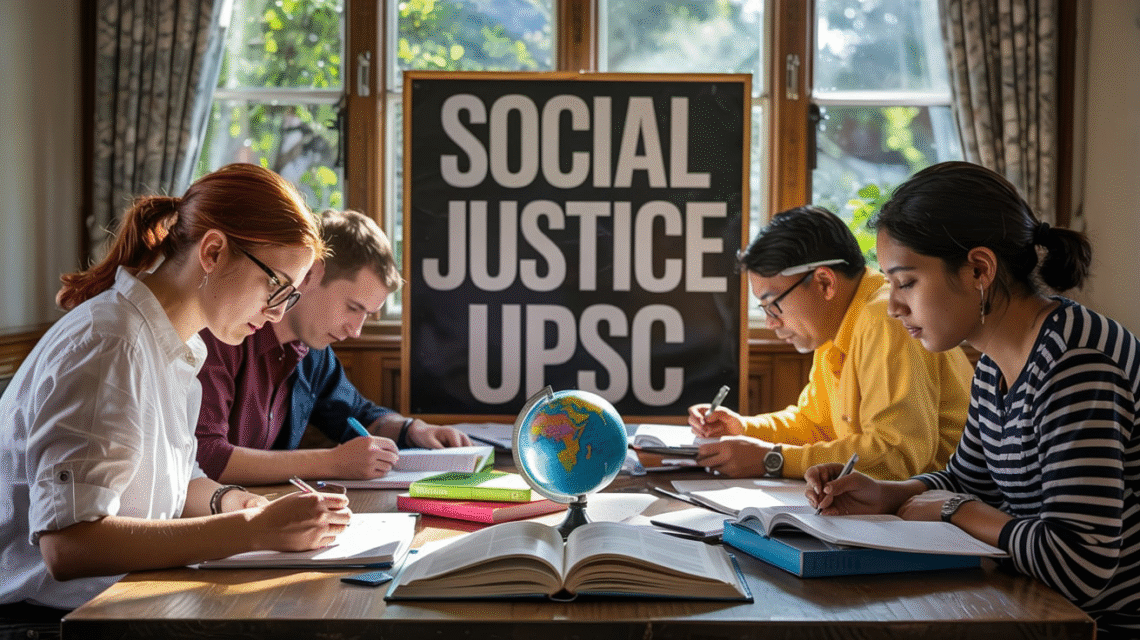Social justice UPSC is one of the most important topics for UPSC aspirants who want to score well in their exams. Social justice UPSC focuses on fairness, equality, and the rights of every person in society. If you are preparing for the UPSC exam, you must learn this topic with a clear mind and easy understanding. Many students get confused because the topic sounds big, but it’s actually simple once you understand the meaning of justice and equality for all. In this post, we will break down social justice in a very easy way so that even a beginner can understand and remember it easily.
Social justice in UPSC mainly teaches how a fair society works. It means everyone, rich or poor, should get equal chances to grow, study, and live with respect. The Indian Constitution supports social justice through various articles and rights that protect people from unfair treatment. UPSC wants students to understand how these values help make India a strong and equal country. This topic is not only important for the exam but also teaches you how a good society is built. In this blog, we will talk about meaning, examples, related constitutional articles, and tips to prepare for this topic easily.
Importance of Social Justice in UPSC
Social justice is one of the most important topics for UPSC aspirants because it appears in General Studies papers, essays, and interviews. UPSC expects future officers to understand how fairness and equality help in good governance. If a civil servant understands social justice, they can make better decisions that benefit everyone equally. It teaches you to look at every citizen as equal and help those who are left behind.
This topic also helps you connect various areas like economics, politics, and ethics. For example, when you study social justice, you also learn about poverty, inequality, education, and gender issues. These are major challenges in India today. Social justice helps you think about solutions that improve people’s lives and make the country stronger. In short, it is not just a UPSC topic but also a moral value that every officer must follow.
Meaning and Scope of Social Justice
The meaning of social justice is simple yet deep. It means every person should get equal rights, opportunities, and treatment in society. It supports the idea that no one should be left out or treated unfairly because of their caste, gender, religion, or income. The scope of social justice covers many areas such as education, health, employment, and social security.
In UPSC, the scope of social justice includes topics like equality before law, affirmative action, and welfare programs. It also talks about social harmony and removing inequalities between different sections of society. Understanding this topic helps you write better answers in exams and handle social issues wisely as a future officer.
Social Justice and the Indian Constitution
The Indian Constitution is the foundation of social justice. It was made to ensure that every person in India gets equal rights and opportunities. The Preamble of the Constitution clearly mentions justice—social, economic, and political. This shows that social justice is one of the main goals of our democracy.
Several articles in the Constitution promote social justice. For example, Article 14 gives the right to equality before law. Article 15 bans discrimination based on religion, caste, sex, or place of birth. Article 17 removes untouchability, and Article 46 protects the interests of weaker sections like Scheduled Castes and Scheduled Tribes. These laws help in creating an equal society where everyone can grow and live freely.
Principles of Social Justice
The main principles of social justice are equality, liberty, fraternity, and fairness. Equality means giving everyone the same rights and chances. Liberty allows people to think, speak, and act freely within the law. Fraternity builds brotherhood and unity among people. Fairness means treating everyone with justice and helping those who need extra support.
In UPSC, it is important to remember that social justice is not about making everyone the same but about giving each person what they need to succeed. For example, a poor child may need extra help in education compared to a rich child. Social justice supports such actions to remove inequality and promote balance in society.
Role of Government in Promoting Social Justice
The government plays a big role in promoting social justice through laws, schemes, and welfare programs. It provides free education, healthcare, and social security for the poor and marginalized. The government also creates policies to support women, minorities, and backward classes. For example, reservation policies in jobs and education help weaker sections get better opportunities.
Many schemes like the Mahatma Gandhi National Rural Employment Guarantee Act (MGNREGA), Mid-Day Meal Scheme, and Beti Bachao Beti Padhao are made to promote equality and justice. These programs show how the government works to reduce inequality and improve living conditions for everyone.
Challenges in Achieving Social Justice
Even though India has many laws and policies, achieving complete social justice is still a challenge. The biggest problem is poverty and economic inequality. Many people still do not have access to education, healthcare, and employment. Caste discrimination and gender bias also continue to exist in some parts of the country.
Another challenge is corruption, which slows down the progress of welfare programs. Lack of awareness among people about their rights also makes it difficult to achieve social justice. To overcome these problems, both government and citizens must work together. Education and awareness are the best tools to bring real change.
Social Justice and UPSC Ethics Paper
Social justice is closely linked with the UPSC Ethics paper. It teaches moral values like honesty, fairness, and compassion. When an officer practices social justice, they make decisions that are ethical and fair to all citizens. It also helps in reducing corruption and promoting transparency in government.
For example, if a civil servant ensures that welfare schemes reach poor families on time, that is an act of social justice. Ethics and justice go hand in hand because both aim to make society better and more equal. That is why UPSC gives special importance to this topic in the ethics syllabus.
How to Prepare Social Justice for UPSC
Preparing social justice for UPSC is easy if you follow a smart study plan. Start by reading the Indian Constitution, especially the Preamble and Fundamental Rights. Then go through NCERT books for Political Science to understand the basics. You should also read government reports and current affairs related to social issues.
Make short notes of key concepts like equality, reservation, and welfare schemes. Use simple examples in your answers to show your understanding. Practice writing essays and answers using real-life situations. Watching government programs and speeches can also help you understand how social justice works in real life.
Real-Life Examples of Social Justice in India
India has many examples of social justice in action. One example is the Right to Education Act, which ensures free and compulsory education for children. Another example is the reservation policy that provides opportunities to Scheduled Castes, Scheduled Tribes, and Other Backward Classes. The government also runs programs for women’s safety and empowerment.
Judgments from the Supreme Court have also promoted social justice. For instance, the court has upheld women’s rights, supported the LGBTQ+ community, and fought against child labor. These real-life examples show how India is working toward equality step by step.
Social Justice in UPSC Mains and Essay Writing
Social justice questions are very common in UPSC Mains and Essay papers. You can expect questions related to equality, poverty, and constitutional provisions. To write a good answer, you must link theory with real examples. Always start with a clear definition, explain the importance, and mention government schemes and challenges.
When writing essays, use simple words and keep a positive tone. You can also add quotes from famous leaders like Mahatma Gandhi or Dr. B.R. Ambedkar. This makes your answer strong and impressive.
Conclusion
Social justice UPSC is not just a topic to study—it is a value that helps shape a fair and strong society. It teaches future officers how to make decisions that help everyone equally. India’s Constitution, laws, and welfare schemes all aim to bring justice and equality to every citizen. But true social justice can only be achieved when both the government and people work together to remove inequality and promote kindness and respect for all.
FAQs
What is social justice in simple words?
Social justice means giving equal rights and chances to every person without any discrimination.
Why is social justice important for UPSC?
It is important because it teaches future civil servants how to build a fair and equal society.
Which articles in the Indian Constitution support social justice?
Articles 14, 15, 17, and 46 support social justice by promoting equality and protecting weaker sections.





